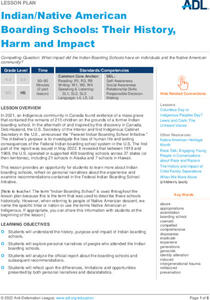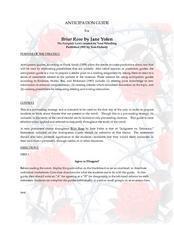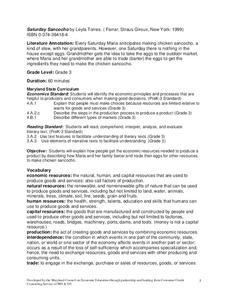Curated OER
Family Stories and Personal Narratives
Fourth graders read various stories in their literature books about families. Individually, they make a timeline showing the most important events in their lives. They bring in one artifact from their lives and write a paper about it...
Ford's Theatre
How Perspective Shapes Understanding of History
The Boston Massacre may be an iconic event in American history, but perhaps the British soldiers had another point of view. Using primary sources, including reports from Boston newspapers and secondary sources from the British...
Teaching Tolerance
Slavery as a Form of Racialized Social Control
An engaging lesson delves into the effects of slavery on society. Young historians read text excerpts, complete handouts, and participate in group discussion to understand how slavery was a means to control society and establish a racial...
Curated OER
Language Arts: Guided Reading with Fancy Dance
Pupils participate in a guided reading of Leslie Johnson's, Fancy Dance and discover how to sequence events. This lesson stresses word recognition, suffixes and prefixes, and sentence structure. Cross-curricular activities involve art,...
Curated OER
Chinese Zodiac
Fifth graders identify the basic elements of a narrative story, such as the beginning, middle, and the end; to analyze the character traits in the story to write a summary using the 5 Ws and How chart included; through sample stories...
Scholastic
Connecting with Ruby Bridges
When Ruby Bridges entered an all-white school in New Orleans in 1960, she also entered history. Scholars consider what the experience must have been like for the young girl using two books that document her experience as well as a double...
Scholastic
Thomas Jefferson and Monticello: An Introduction to Writing Historical Fiction
Thomas Jefferson is one of the most recognized names and faces in America—but is there more to the third president of the United States? Upper elementary and middle schoolers conduct research on Jefferson, his famous home at Monticello,...
Curated OER
Virtual Realities of War
Students outline the major events, mat??riel, and setting of a war or conflict. They develop a computer game narrative that draws on these historically accurate details.
National Endowment for the Humanities
Folklore in Zora Neale Hurston's Their Eyes Were Watching God
Learners define folklore, folk groups, tradition, and oral narrative. They identify traditional elements in Their Eyes Were Watching God Analyze and understand the role of traditional folkways and folk speech in the overall literary...
Crafting Freedom
George Moses Horton: Slavery from a Poet's Perspective
Pupils have the unique opportunity to learn about the institution of slavery by reading first-hand experiences as described by George Moses Horton, the first slave to publish anti-slavery poetry.
Anti-Defamation League
Indian/Native American Boarding Schools: Their History, Harm and Impact
Encultureate, assimilate, or eliminate? The 2021 discovery of a mass grave of over 200 children on the site of a former Canadian Indian Boarding school led to the creation of the Federal Indian Boarding School Initiative. High schoolers...
K20 LEARN
Plantation Life And Slavery: Antebellum Era
Learners evaluate primary sources from the antebellum era to determine the accuracy of textbooks. They examine narratives from enslaved people, then compare them to their own text. Extension activities include the opportunity to write a...
Curated OER
Crude Conversation
Students analyze text and maps in determining the effect the world's energy resources have on human society, and make charts illustrating at least three ways each resource makes life easier for human society.
Curated OER
Briar Rose: Anticipation Guide
Prepare your readers for Briar Rose with an Anticipation Guide that asks them to agree or disagree with a series of statements that reflect issues raised by Jane Yolen’s narrative about a young girl’s research into her grandmother’s...
National Endowment for the Humanities
Revolution '67, Lesson 2: What Happened in July 1967? How Do We Know?
Even in a world in which dozens of participants and curious onlookers record every controversial event, the basic facts of what happened are often in dispute. Revolution '67, Lesson 2 explores 1967 Newark, New Jersey using an examination...
Curated OER
African-American History and Culture in the English Classroom
Ninth graders identify and recognize characteristics of nonfiction in literary works, explore language and culture of Gullah people, compare and contrast purposes of spirituals and quilts in terms of their relationships to escape from...
Curated OER
Historical Agency in History Book Sets (HBS)
Study historical events by combining the study of historical fiction and non-fiction. Learners read about true past events in historical fiction novels and then research non-fiction accounts of the same events. What are some differences...
Scholastic
The Midnight Ride of Paul Revere
Practice sequencing events using Henry Wadsworth Longfellow's narrative poem about the famous revolutionary hero. Learners read Revere's own account of the event, and compare/contrast the two texts using a t-chart. Finally, they imagine...
Curated OER
No Place Like Home
Learners analyze photographs of high plains sod homes and read accompanying narratives. They then choose one photograph and, using the copy and paste features and simple drawing tools available in Microsoft Word, students identify...
Curated OER
Saturday Sancocho
Second graders identify the economic principles and processes that are helpful to producers and consumers when making good decisions. Students will read, comprehend, interpret, analyze, and evaluate literary text as well as explain how...
Curated OER
Making Choices
Learners explore the life of Harriet Tubman. They examine a painting of Harriet Tubman and consider the tools used to communicate information about her. Sudents describe how the color of a painting explains the mood of the illustrator....
Curated OER
In Their Own Words: Slave Narratives
Students identify primary sources, explain the strengths and weaknesses of personal accounts in history, and negotiate the Library of Congress Database. They also analyze documents and write a summary that compares and contrasts the...
Santillana USA
Celebra Kwanzaa
¡Celebramos Kwanzaa! Celebrate Kwanzaa through the fictional story Celebra Kwanzaa con Botitas y sus gatitos to delightfully explain the seven principles of Kwanzaa. Dual language learners participate in reading and vocabulary activities...
Curated OER
A Brief History of Fairfax County
Pupils brainstorm a list of things they already know about the history of Fairfax County, Virginia. After reading a primary source document, they discuss the similarities and differences between their prior knowledge and what they read....

























